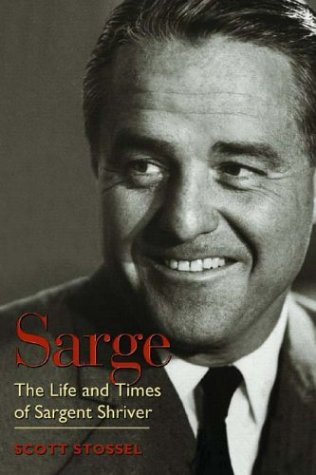
Fate dealt Sargent Shriver two hands, and Scott Stossel, a senior editor at Atlantic Monthly, has written an interesting and detailed account of Shriver’s remarkable record of public service and somewhat turbulent life as a Kennedy in-law
Shriver bio shines light on politics
Reviewed by Edwin O. Guthman
Fate dealt Sargent Shriver two hands, and Scott Stossel, a senior editor at Atlantic Monthly, has written an interesting and detailed account of Shriver’s remarkable record of public service and somewhat turbulent life as a Kennedy in-law.
One hand of fate groomed Shriver for intense, persistent leadership. His forebears had participated vigorously in Maryland politics since Colonial days and fought in the Revolutionary War, the War of 1812 and the Civil War (although Shriver’s grandfather, Herbert Shriver, was a Confederate soldier). Shriver, born in 1915, grew to manhood in a family that was keenly involved in Democratic Party politics and devoutly Roman Catholic. He attended Yale University went on to Yale Law School. He reported for duty in 1941 as a Navy ensign and saw extensive combat in World War II.
The other hand of fate ensnared him in 1946, when he was an assistant editor at Newsweek magazine and Joseph P. Kennedy, the controversial, highly successful major-domo of the Kennedy family, asked him to read the letters and diaries of Joe Jr., who had been killed test-flying a plane over Belgium in World War II.
Then Shriver accepted a job offer from Kennedy in Chicago, and later married Kennedy’s daughter, Eunice, a brilliant activist in social causes and politics. In 1960 Shriver abandoned his career and plans to run for governor of Illinois to work in JFK’s campaign for the Democratic presidential nomination and the presidency. When JFK sought to create a “peace corps” of young Americans willing to serve overseas, he chose Shriver to study the feasibility of and then form and lead such an agency, which Shriver did with remarkable leadership and energy.
After JFK’s death, President Johnson chose him to head LBJ’s War on Poverty. Thereafter, Shriver’s career had its ups and downs. LBJ sent him to Paris as ambassador, then followed two unsuccessful political ventures – as Sen. George McGovern’s vice presidential candidate in 1972 and an unsuccessful bid for the Democratic presidential nomination in 1976. But he remained highly active as a lawyer and, with Eunice, deeply involved in the Special Olympics.
Shriver’s contribution to the nation might be news to many readers, but Stossel has recounted Shriver’s role with a fullness that brings light and meaning to politics and governing in 20th-century America.
“Sarge: The Life and Times of Sargent Shriver,” by Scott Stossel. Smithsonian. 704 pages. $32.50. Edwin O. Guthman is a professor at the University of Southern California school of journalism and was editor of The Philadelphia Inquirer from 1977 to 1987. He wrote this for the Baltimore Sun.
